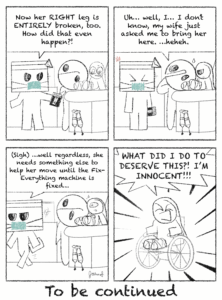Who’s your Daddy? It’s not me. I’m not your daddy. But I am a linguistics student with internet access, and I want to know how in the world “daddy” has become what it is. Let’s find out together. Well, not really together, because I already know and you don’t know. Okay.
“Daddy” has a myriad of definitions, from its original use as a term of endearment for a father to its more metaphorical derivatives that have emerged throughout the years. For now, we’ll only be looking at “daddy” in the sexual context that’s been en vogue.
The Random House Historical Dictionary of American slang traces the earliest use of “daddy” to 1681, when prostitutes would use the term to refer to older customers or their pimps. Despite this, it is arguable that the most well-known originator of “daddy” is in The Zombies’ iconic “Time of the Season,” in which Colin Blunstone asks “What’s your name? /Who’s your daddy? /Is he rich like me?”
It’s all very tasty. But it is important to note that before “Time of the Season,” “daddy” was pretty prevalent in African American dialect and jazz music, as seen in Ella Fitzgerald’s 1954 recording of “My Heart Belongs to Daddy.” The Zombies simply brought the term to the mainstream. Regardless, since its conception as a slang term, “daddy” has generally referred to a male lover with money.
This definition is fairly broad, so like anyone looking for a little clarity, I turned to Urban Dictionary. The most popular recorded definition comes from 2003, in which user tmacafella describes a “daddy” as someone who “who takes care of her, looks ou ofr her, (like a daddy).” That’s better.
This definition provides us something concrete to discuss the semantic change of “daddy.” In other words, why did “daddy” depart from being an actual father and slide on into being a weird sex thing that maybe makes you really uncomfortable? Or maybe you’re really into? But either way, why?
It’s pretty simple. It’s a big ol’ metaphor. The concept of a father is a male figure that provides for a child. This concept has since extended to male lovers who are also expected to provide and, in some ways, dominate their relationship. This is a natural linguistic progression also seen in words like “broadcast,” which originally referred to the act of casting seeds out for birds.
Semantic changes occur for a variety of reasons, and in the case of “daddy,” these reasons are most likely due to sociocultural influence. Basically, the patriarchal idea that the man in a relationship should be the authoritative force, similar to an actual father. As for why people enjoy metaphorically likening men they have sex with to their dads, that’s some Sigmund Freud shit, and I won’t be going there.
But I’m still going. You thought I was done. I’m not. I would be. But I’m not. Why? Because in recent years, “daddy” has evolved into even more subsets. The two most notable are probably “daddy af” and “zaddy.” I didn’t do this, you did.
“Daddy af” is a little easier to explain. It’s simply a open form compound word composed of the intensifier “as fuck” and “daddy.” It’s typically used online in reference to males that users find attractive and in some ways, powerful. For example, I think Noam Chomsky is daddy af.
“Zaddy,” on the other hand, was a whirlwind to research. I have come to the conclusion that it’s a portmanteau of the phrase “sugar daddy” (the phonological change from the palatal fricative /∫/ in “sugar”, to the voiced alveolar fricative /z/ is due to the vowel change from “u” to “a”) (you’re welcome). The best example of its use is most likely in Ty Dolla $ign’s “Zaddy,” where Keke Palmer refers to a pair of “shoes down on Rodeo I really wanna get,” and Dolla $ign says, “Zaddy gon’ pull up and he gon’ fuck you all night.” Cool!
There’s definitely more to be said about “zaddy,” and even “daddy” in general, but I’m starting to feel like every sentence I add to this takes a year off my life. So that’s all for now. Don’t forget to call your dad on the weekends.

